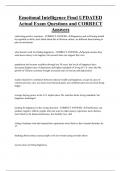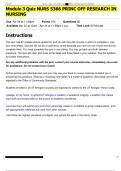Emotional Intelligence Final UPDATED
Actual Exam Questions and CORRECT
Answers
cultivating positive emotions - CORRECT ANSWER- ✔✔happiness and well-being should
be regarded as skills, don't think about this in Western culture, no different than learning to
play an instrument
what doesn't work for finding happiness - CORRECT ANSWER- ✔✔people assume they
need more money to be happier, but research does not support that view
population has become wealthier through last 50 years, but levels of happiness have
decreased (higher rates of depression and higher standards of living in U.S. since the 60s,
growth of Chinese economy brought increased rates of anxiety and depression)
studies found low correlation between material wealth and happiness, except in cases of
extreme poverty, once you meet your financial goals, new problems prevent you from being
happy
average buying power in the U.S. tripled since 50s, and also better living standards, but
happiness unchanged
looking for happiness in the wrong direction - CORRECT ANSWER- ✔✔ineffectual, can
produce negative effects, people who just want to make money experience more distress,
more likely to be depressed/anxious, less healthy, less vital
college freshman who had materialistic aspirations more likely to have mental disorders by
37
thinking about money causes people to be less warm/caring towards others
success does not bring happiness
,happy people tend to... - CORRECT ANSWER- ✔✔have high self-esteem, be
optimistic/outgoing/agreeable, have close friendships/satisfying marriage, have work and
leisure that engage their skills, have a meaningful religious faith/spiritual life, sleep well,
exercise, subjective health
happiness is not related to... - CORRECT ANSWER- ✔✔age, physical attractiveness, gender,
educational level, parenthood, objective health
top factors influencing happiness - CORRECT ANSWER- ✔✔social relationships (single
biggest predictor of happiness, quality not quantity), optimism, self-esteem/self-acceptance,
locus of control, sense of meaning/purpose to life, sleep, exercise
optimism: neurophysiological bases - CORRECT ANSWER- ✔✔the right hemisphere is
associated with pessimism, left hemisphere associated with positive emotions
early research showed hemispheric dominance developed in early childhood and doesn't
change, but recent studies indicate there are effective ways of changing it, such as meditation
meditation and hemispheric dominance - CORRECT ANSWER- ✔✔EEG studies by Richard
Davison, mindfulness meditation associated with increased left frontal activity, long term
meditators show high degrees of left frontal activity, an elderly Tibetan monk showed
greatest, senior monk showed to have highest level ever, other studies show less extensive
meditation is associated with a significant shift in hemispheric dominance, degree of shift
correlates with enhanced immune system
mindfulness in daily life - CORRECT ANSWER- ✔✔mindfulness practice is about a way of
being that extends to how we engage in all of our daily activities, it's knowing you are exactly
where you should this moment, appreciating this moment, engaging in activities with full
focus of attention, e.g. walking meditation, shake off all worries/anxieties, don't think of the
future or past, just enjoy the present moment, don't rush through washing dishes or it will
become an unpleasant task and we will be incapable of enjoying other things, you cannot just
selectively focus on pleasant tasks, find the meaning of life in simple acts
goal-oriented culture - CORRECT ANSWER- ✔✔in the west we are very goal-oriented, we
know where we want to go, we are very directed in getting there, but we often forget to enjoy
ourselves along the way
,mindful eating` - CORRECT ANSWER- ✔✔sit comfortable, examine the raisin, smell it,
notice thoughts, place it in your mouth, become aware of your tongue, bite lightly, chew 3
times, describe flavor and texture, complete chewing, swallow, repeat
research on mindfulness practice and subjective well-being (self-reported happiness) -
CORRECT ANSWER- ✔✔Brown found large discrepancy between financial desires and
financial reality = low subjective well-being, but accumulation of wealth did not close the
gap
mindfulness practice = lower financial desire discrepancy = higher subjective well-being,
promotes the perception of having enough
flow - CORRECT ANSWER- ✔✔Csikszentmihalyi is a leading researcher in subjective well-
being, found that happiness depends on ability to immerse oneself in flow of focused activity
flow is a state devoid of emotional static, except for a highly motivating feeling of mild
ecstasy, seems to be a by-product of attentional focus needed for flow, associated with
lessening of cortical arousal
experience sampling method (ESM) - CORRECT ANSWER- ✔✔how Csikszentmihalyi
studies real time happiness, pager goes off at random times within each 2-hour segment of the
say, participants write down what they are doing/what they are thinking about, rate their
consciousness on various scales
keys to finding flow - CORRECT ANSWER- ✔✔have a clear set of goals (usually on the job
than in free time, having leisure does not improve quality of life unless you learn how to use
it effectively), structure tasks so that they are challenging but not too challenging, choose
activities that are active rather than passive (more flow experiences in reading books than
watching TV), take control of your time, set goals and divide them into daily aims, engage in
social interactions (moods of depressed people indistinguishable from healthy people when
they are in company)
gratitude/appreciation & optimism - CORRECT ANSWER- ✔✔gratitude/appreciation is an
evidence-based method for increasing optimism, actively look for positive attributes and
select good feeling thoughts, it will become a habit of mind, both positive and negative
thoughts are self-reinforcing, about long-term potentiation (LTP), stimulating a particular
memory circuit will increase sensitivity of neurons in that circuit so they fire more easily
, gratitude journaling - CORRECT ANSWER- ✔✔each night write down at least 5 things that
made/make you happy, things you are grateful for, can be big or small, vary the domains of
life in which you count your blessings, okay to repeat yourself, but try to keep the emotions
fresh, re-experience the feeling associated with each item as you write it down, can also be
helpful to provide a casual explanation for each
Seligman study, people with severe depression instructed to write down 3 good things that
happened every day, within 15 days average depression shifted from severely depressed to
mildly/moderately depressed, 94% experienced relief, more benefits observed in one time a
week b/c exercise kept fresh/meaningful
expressions of gratitude increase optimism, life satisfaction, physical health, time spent
exercising, helping behavior, sense of connection with others, and hours of quality sleep
self-esteem - CORRECT ANSWER- ✔✔one of the top predictors of happiness, in particular
negative self-esteem is one of the biggest predictors of negative affect, however some studies
found contradictory/inconclusive results because of failure to distinguish between true self-
esteem (self-acceptance, authenticity, self-efficacy) and bogus ego inflation (contingent of
external evaluations, like narcissism), sensitive tests like the implicit attitudes test (IAT) can
distinguish between these different types
implicit attitudes test (IAT) - CORRECT ANSWER- ✔✔assign each name to the category to
which it belongs by tapping your finger in the appropriate column as quickly as you can,
effects are not subtle, on the surface people with narcissistic personality disorder seem really
confident, but are more likely to associate negative adjectives with themselves on the IAT
sentence completion self-esteem exercise - CORRECT ANSWER- ✔✔by Nathaniel
Branden, a commonly used psychotherapeutic method for raising self-esteem
quickly generate at least 6 endings to sentence stems, no right or wrong answers, some
answers may contradict each other, put aside your critical mind, think after not during,
afterwards go over your responses and see whether you learned anything important
self-esteem and social comparison - CORRECT ANSWER- ✔✔cultivating self-esteem
reduces tendency to engage in social comparison, which is highly correlated with negative
affect





